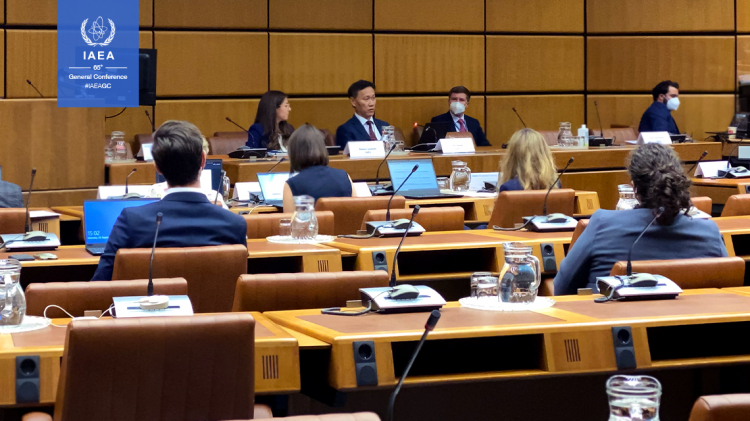Steering the world to net zero emissions to meet global climate goals is no simple task. It will require concrete energy policies as well as the next generation of scientists, engineers and policy makers to lead them to the finish line. Today, on the margins of the 65th IAEA General Conference, the IAEA announced the winners of the IAEA Net Zero Challenge, a contest that asked young people around the world to craft winning policy proposals for the clean energy transition.
The IAEA shortlisted six papers from a total of 71 submissions that responded to the question: How can nuclear energy, alongside other low carbon energy sources, help your country or region to achieve their net zero targets? At today’s event, the six finalist teams—from Nigeria, the Republic of Korea, Russia, Singapore, the United Kingdom and the United States—were invited to present their proposals before an IAEA jury, which after careful consideration selected the team from Singapore as the winner.
“Your papers are a testament to how indispensable nuclear energy is in fulfilling the climate change goals that countries have aspired to achieve through the Paris Agreement,” said Mikhail Chudakov, IAEA Deputy Director General and Head of the Department of Nuclear Energy, referring to the six finalist teams. “Climate change remains the greatest environmental challenge of our time and, above all, for future generations. So, it is only natural that we have asked young people for their input and proposals on how to reach net zero.”
The project from Singapore was presented by Claire Li, a 20-year-old student from the London School of Economics and Political Science, who worked with Komal Prashar and Linda Zheng on a hypothetical proposal that would help the island nation decarbonize the global shipping industry through an initiative to use fuel cells with green hydrogen produced by low-carbon nuclear energy. Singapore does not operate any nuclear power plants, and the team’s plan would rely on partnerships with other countries for the import of nuclear-produced hydrogen.
“This is one way Singapore can contribute globally to decarbonization,” said Li. “Singapore is a leading global port with a lot of available infrastructure and resources. By doing this, it can set the standards for other ports in the world.”
A representative of the winning team will have the opportunity to participate in an IAEA event at the UN Climate Change Conference (COP26) in November in Glasgow. The IAEA plans to hold several events at COP26, presenting the scientific and technical reasons on how nuclear energy plays a significant role in climate change mitigation. The IAEA will inform political leaders, industry, scientists and civil society attending the COP26 about the benefits of nuclear science and technology in helping the world to both mitigate and adapt to climate change.








